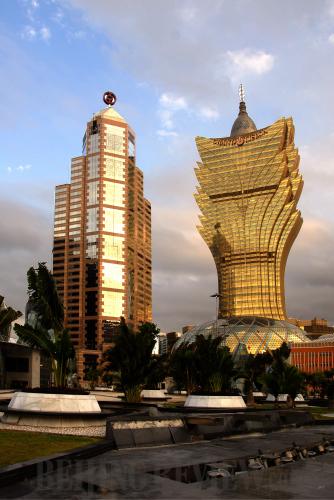|
 |
|
SKYSCRAPERS: Two of Macao's landmarks--the Bank of China Tower and the Lisboa Hotel Macao, November 16, 2009 (XINHUA) |
The region's residents are enthusiastic about their society's political affairs, a feeling that has surged compared with a decade ago. In February 2008, the Macao SAR Government consulted the public on proposed revisions to the Chief Executive Election Law, the Electoral Law for the Legislative Assembly and the Voter Registration Law in Macao. It took less than three months for the government to collect more than 7,400 suggestions from the public. "Ordinary citizens are very enthusiastic about participating in revising the law, which was an impossibility when Macao was under Portuguese colonial administration," said Florinda da Rosa Silva Chan, Secretary for Administration and Justice of Macao SAR Government. She said some of the suggestions were adopted by the final revision.
"The greatest change to Macao's administration since its return to China is that a bureaucratic government has been replaced with a people-oriented government," said Chan. According to her, government departments are being encouraged to get ISO certification to improve the quality of their management and to launch user-friendly services such as e-government and one-stop initiatives. She added her department drafts detailed regulations requiring civil servants to wear name tags at work and answer phone calls by first telling people his or her name and title.
Lau Cheok Va, President of Macao's Legislative Assembly, said after Macao's return to China, members of the Legislative Assembly have become more active in participating in legislative affairs and voicing their opinions, which he believes is a positive phenomenon. "Residents now think of themselves as Macao's masters and are more willing to make suggestions to Legislative Assembly members," said Lau.
"Macao's society has achieved unprecedented progress in its politics, legal system, education, cultural causes, social security systems and economy. Although civil servants and ordinary citizens still have some complaints about the government because people cannot share the fruits of social progress absolutely equally, the achievements predominate," said Ieong Wan Chong, Director of the Center of Studies of One Country, Two Systems at Macao Polytechnic Institute. He suggested that Macao SAR Government enhance its efforts to help the region's disadvantaged groups.
In a public poll on core social values conducted by Ieong's center in April and May 2009, the largest number of respondents voted for the slogan "loving China and loving Macao," with 49 percent selecting it. Others chose "fair competition and equal opportunities" (42 percent) and "safeguarding human rights" (41 percent).
Gaming-fuelled economy
From 1996 to 1999, Macao's economy shrank, causing a rise in the unemployment rate to 6.3 percent in 1999.
"I remember back then that people with a job worked very hard to keep it while unemployed people were desperate because it was almost impossible for them to find one," recalled Vivian Wong, an editor at Macao Monthly.
While Macao's economy started to grow again the first year after its return to China at an encouraging 5.7 percent in 2000, the real boom occurred after the SAR Government's liberalization of its gaming industry and the acceptance of new gaming concessions in 2002. The change to Macao's gaming industry, which has a long history in the area that can be traced back to the 16th century, put an end to the decades-long monopolization of the business by casino magnate Stanley Ho. Now Macao is home to six companies with casino licenses, which operate more than 30 gaming establishments. In 2002, they contributed roughly 30 percent of Macao's GDP and employed more than 10,000 residents. In 2006, Macao surpassed Las Vegas in total revenue to become the gaming capital of the world. In 2008, those numbers swelled to more than 60 percent of Macao's GDP and 60,000 jobs.
The region's Chief Executive Ho said that the liberalization of the gaming sector had resulted in a string of social problems, but gave a boost to development in other industries and improved both citizens' access to jobs and their standard of living.
"Its development has caused many social problems, but I believe the pros overweigh the cons," said Ho.
However, Ho said Macao's future relies on cultivating a more diverse industrial structure that includes the growth of new industries like non-gaming tourism, the conference and exhibition industry, retailing, investment-related services and the creative industry.
Macao's manufacturing industry, which peaked in the 1980s and 1990s, has shrunk steadily amid fierce competition within the global quota system for the textile industry that came to an end in the new century. "Macao's manufacturing industry was predominantly engaged in processing foreign goods," said Sou Tim Peng, Director of Macao Economic Services. Sou said it is important for Macao to maintain a manufacturing industry, as it could diversify the region's economic structure and create job opportunities.
|
